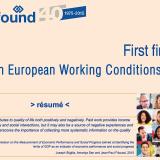For many years now, Eurofound has collected information on various aspects of working time and their implications for working conditions and quality of life of men and women in the EU. Eurofound’s studies on working time aim to improve understanding of how long workers work and how their time is organised and the implications of working time patterns for employment, productivity, well-being and the balance between work and private life. Data on collectively agreed working time and the role of the social partners have been published regularly, and have also been analysed from a long-term perspective. Research on men’s working time versus women’s shows that men are much more likely to work longer hours and women are more likely to spend more time doing unpaid domestic work. While most individuals, regardless of their sex, seem to be satisfied with their current working time, the majority of those expressing a preference to change their working time say they would like to reduce their hours.
Regulation and organisation of working time
Regulating working time has a role to play in increasing work–life balance and also labour market participation. In a fast-changing economic climate, companies and workers need flexibility. Eurofound has explored the relationship between working time and work–life balance in a life course perspective.
Research has looked at the various aspects of the organisation of working time and the implications for productivity and working conditions. As the organisation of working time is changing, Eurofound together with the International Labour Organization examined the effects of telework and ICT-mobile work on the working time of those engaged in such work arrangements.
Taking a long-term perspective on working time, Eurofound has examined the evolution of aspects of collectively agreed working time in the EU at the beginning of the 21st century. The research focused in particular on five sectors: chemicals, metalworking, banking, retail and public administration. It described the institutional regimes of working time regulation and assesses changes in agreed working hours and usual working hours between 1999 and 2014.
Eurofound has also looked at the national approaches on how and when breaks from work should be taken. The research compares different approaches among Member States, gives examples of judicial rulings, highlights some types of work that attract special consideration and looks into causal relationships between breaks, health and performance at work.
Research on new ways of working fostered by digitalisation like teleworking and platform work have highlighted the increasing trend towards flexible working with far-reaching implications for the duration and organisation of working time. These aspects are also part of the regulatory debate at EU and national level, for instance wtih the adoption of legislation on the right to disconnect.
Working time in survey analysis
Eurofound’s three major surveys provide data on issues related to working time.
The European Working Conditions Survey (EWCS) covers working time from various angles. In the 2021 European Working Conditions Telephone Survey (EWCTS), working time arrangements was one of six dimensions of job quality analysed. This dimension includes unsocial work schedules (as a job demand) and working time flexibility (as a job resource). The EWCTS captured four types of working time that are generally regarded as unsocial: regularly working in one’s free time, regularly working at night, working long hours and regularly being required to work at short notice. Flexibility in working hours is positively related to worker’s well-being and supports a healthy balance between their personal and working lives. The EWCTS highlighted the ease with which an individual can take an hour or two off during working hours to attend to a personal matter as an indicator of such flexibility.
Using EWCS 2015 data, Eurofound has examined working time patterns for sustainable work. The analysis looks at the links between working time patterns, work–life balance and working time preferences, as well as workers’ health and well-being. It also assesses how sustainable the current working conditions and working time patterns are into the future.
The European Quality of Life Survey (EQLS) looks at working time arrangements, both paid and unpaid, and their impact on satisfaction with work–life balance.
Working time arrangements can have a significant bearing on the efficiency, productivity and competitiveness of companies, not to mention the health, well-being and motivation of their employees. Through its European Company Survey (ECS), Eurofound has also carried out comprehensive research on working time and work–life balance. It has looked at the prevalence of flexible working time arrangements and working time accounts, part-time work, overtime and non-standard working hours; parental and other long-term leave; phased and early retirement; as well as specific policies to support work–life balance in companies.





















